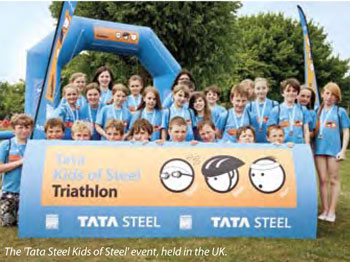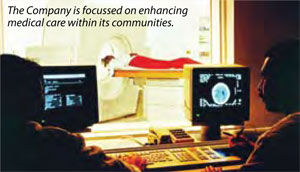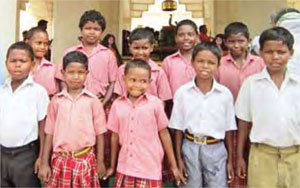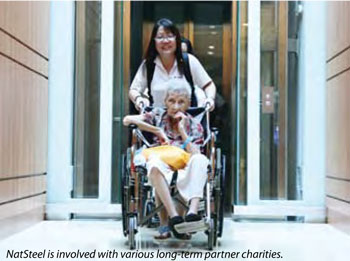| |
 |
Tata Steel, the first company to be incorporated in India, was founded on the belief that the creation of wealth could accelerate economic and social development. The Company continues to serve this purpose till date by focusing on responsible business practices, which emphasise on social and economic issues to achieve inclusive growth.
To propel inclusive growth, the Company has adopted a two-pronged approach addressing urban needs and
rural imperatives separately. In India, for instance, urban Jamshedpur and the rural hinterland around Jamshedpur, mines and collieries and greenfield projects in Odisha are served by different organisations assigned to the task.
|
Innovating and investing to promote the well-being of the society
An intensive relook at its social strategy in 2010-11 prompted the Indian operations of Tata Steel to increase its allocation for social initiatives to  146 crores (US$31 million) in Financial Year 2011-12 from 146 crores (US$31 million) in Financial Year 2011-12 from  1126.28 crores (US$27 million) in Financial Year 2010-11. This includes an almost three-fold increase in educational scholarships to children from poor and marginalised groups. 1126.28 crores (US$27 million) in Financial Year 2010-11. This includes an almost three-fold increase in educational scholarships to children from poor and marginalised groups.
In 2011-12, the introduction of the Human Development Index (HDI), a global measure which is a composite index of health, education and income levels, provided an assessment of the holistic impact of the Company's interventions in rural areas.
The Index covered 112 villages in the state of Jharkhand during 2011-12. In 51 villages, the HDI was better than the state average, while in 33 villages, the HDI was better than the national average. A similar exercise will be carried out in all villages both in Odisha and Jharkhand in 2012-2013.
|
Employee volunteerism
Employees of Tata Steel Europe at IJmuiden applied their skills in practical ways for the community by refurbishing buildings and gardens at Hartekamp Groep – a local institute for people with learning difficulties. They also revamped a mini golf course to make it wheelchair accessible. Employees also helped construct an orphanage in Kenya. In the Netherlands, employees supported an anti-litter organisation, and worked with students on innovative ideas to prevent litter from steel cans. In the UK, the packaging steel recycling arm worked with children in 19 primary schools on the benefits of recycling.
The Company's European operations began focusing on harnessing individual fund-raising activities by units in Europe in 2011-12 to enhance their impact. For instance, on Teesside, employees donated £35,000 (US$54,000) to build a new seal viewing area for the local community.
Similarly, S$37,408 was raised through a charity bowling event by NatSteel and its employees, the proceeds of which went to the People's Action Party Community Foundation Assist Scheme, which offers financial assistance to post-secondary students from low-income families.
|
Social change through sports
The sports excellence structure supported by the Company, which includes sports infrastructure,
training centres and academies, has contributed to the development of football, archery and athletics. In
2011-12, Deepika Kumari and Jayanta Talukdar, cadets of the Tata Archery Academy were selected to represent
India at the London 2012 Olympics. Academy coach Purnima Mahato was nominated as the coach of the Indian Archery Team. The Tata Football Academy launched its grassroots-training programme to train potential footballers between the ages of eight and ten years.
Active participation in sports, by adults and children alike, has been a thrust area in Europe. A corporate partner for British Triathlon since 2006, Tata Steel supports the 'Tata Kids of Steel' series across UK, which enables children to experience the disciplines of the triathlon in a fun, supporting atmosphere. Since 2007, over 35,000 children from almost 400 schools have participated in the programme. The Company's support for the British Paratriathlon Championships since the inaugural event in 2008, led to its inclusion in the Rio 2016 Paralympics.
In 2011-12, the Tata Steel Chess Tournament, an important event for the economy of host town Wijk aan Zee, located close to Tata Steel's IJmuiden plant, marked its 73rd year. The tournament attracts thousands of international visitors, including chess grandmasters, and also gives local people a chance to participate.

The 'Tata Steel Kids of Steel' event, held in the UK.
|
 |
SUSTAINABILITY IN ACTION
|
|
| – |
Tata Main Hospital (TMH), a 900-bed hospital provides specialised indoor and outdoor care to the community in Jamshedpur. TMH also serves as a centre for postgraduate medical education. During 2011-12, capabilities of the departments at TMH were significantly enhanced and a state-of-the-art Intensive Care Unit added to the hospital. Nine dispensaries and a public health service provide health care services to one million citizens of Jamshedpur. Societies run by Tata Steel ensure availability of disability services, health services (immunisation and family planning) and specialty health services such as medical care at the Meherbai Tata Memorial Hospital and the Jamshedpur Eye Hospital. |
| – |

Cancer care and research in Europe has received support from the Lady Tata Memorial Trust for over 78 years with an annual grant of £500,000 (US$780,000) made towards blood cancer research. The Trust currently supports a project at the Institute of Cancer Research to help develop a genetic test to identify treatments for incurable Myeloma cancer. Leading cancer charities Macmillan and Marie Curie have also benefited. Awareness-raising campaigns in 2011-12 raised an impressive £100,000 (US$156,000) for Marie Curie. |
|
|
|
Access to urban amenities
Jamshedpur Utilities and Services Company (JUSCO) is the urban civic amenities provider across the leasehold area of the Company in Jamshedpur. Its services cover water management, power distribution, management
of municipal solid waste, public health and horticulture. Urban Services deploy Tata Steel's social initiatives
in Jamshedpur. It covers the areas of education, employability, primary health care and infrastructure
development to decongest the town, and the building of drains, community roads, public toilets, etc.
|
 |
SUSTAINABILITY IN ACTION
|
|
|

The Tribal Cultural Society of Tata Steel has been actively working with the 'Sabar' and 'Birhor' tribes that currently populate only a few districts of Jharkhand. One of the key areas that the agency has worked on is the education of tribal children.
The Tribal Cultural Society launched a pilot project in 2011 in collaboration with a private residential school. The Society worked to convince the parents and in July 2011, 10 Sabar children from Dongagaral and Dholkocha villages were sent to Holy Cross School, Chowka for residential education.
The Society has also launched Project Aakanksha, an education programme under which 118 students have been enrolled for residential school education.
|
|
|
|
Rural development
Sustainable development and inclusive growth in the rural areas of India is facilitated by Tata Steel's Corporate Sustainability Services (CSS) through the Tata Steel Rural Development Society (TSRDS), the Tata Steel Family Initiative Foundation (TSFIF) and the Tribal Cultural Society (TCS). Its initiatives span sustainable livelihoods, health care, education and empowerment of women.
Sustainable livelihoods - The principle focus is on poverty alleviation through agricultural development and improvements in productivity, skill-based training for the youth to allow them to benefit from existing and emerging opportunities, and enterprise development both at the community level and as part of the
Company's supply chain.
Education - Tata Steel's focus is on accessibility and quality education services, with a special emphasis on the girl child. Initiatives include Camp Schools, Non-formal Education, financial support to meritorious students, adult literacy programmes and special classes to prepare students for Grade 10 exams.
Health Care - Tata Steel provides preventive, promotive and curative health care services in rural areas. Hospitals, dispensaries, mobile medical units and health care providers touch the lives of over a million people across the states of Jharkhand, Odisha and Chhattisgarh.
Empowerment of Women - The Company supports 737 SHGs encouraging its members to become economically self-reliant and effect change through their collective strength and group dynamics.
In Thailand, the Company also facilitates the growth of local infrastructure by donating construction
materials and equipment to temples, schools and local government agencies. Tata Steel and its employees played
a monumental role in assisting victims of floods that ravaged Thailand in 2011.
NatSteel stays actively involved in furthering the well being of the community in the geographies it operates through its 'Building Beyond Borders' programme. In Financial Year 2011-12, S$91,200 in bursary awards were disbursed to 129 children with physical disabilities or physically disabled parents, as part of the NatSteel-SPD Education Bursary Award, a joint initiative with the Society of the Physically Disabled (SPD). In addition, a partnership with the NatSteel Employees' Union led to S$30,100 being disbursed to 33 children of NatSteel staff as part of the NEU-NatSteel Bursary and Merit Awards.

NatSteel is involved with various long-term partner charities.
In 2011-12, a total of 17 community involvement activities were organised in Singapore with NatSteel's three long term partner charities. In Australia, China and Vietnam, social responsibility activities included bursary awards, engagement with local schools and disaster relief work.
|
|
Resettlement and rehabilitation of communities
In executing its greenfield project in Gopalpur, in the state of Odisha, Tata Steel has met all requirements under the Resettlement and Rehabilitation Policy of the Government of Odisha and also extended its community development initiatives to the displaced families. Benefits which extend beyond the entitlements stipulated in the Government policy include:
Facilitating resettlements through free accommodation in transit homes close to their existing villages to maintain continuity, free transportation of household goods and a welcome package for each
household with free monthly groceries. Rehabilitation assistance via additional land compensation, maintenance allowance, additional house building allowance, rehabilitation infrastructure, medical services, training and development, supplementary allowance, education and infrastructure. Grievance redressal system constituting an internal grievance cell and third party grievance
redressal group.
|
|
To ensure minimum disruption and displacement of people, only three villages Patrapur, Badapur and
Sindhigaon were completely relocated for the proposed plant site and rehabilitated in separate geographical areas within a well-planned colony with all civic amenities. The colony has been divided into ten sectors, each complete with roads, drains, electrical lines and green areas. Their sociocultural identity has been
preserved with the structure of the "Sahi" (hamlets) also being maintained, giving the families a sense of continuity with their old village.
Employment training has been imparted to wards of displaced as well as project affected families, impacting 304 students till 2011-12. Another 190 students are currently undergoing training, while about 600 families have been employed in various construction sites as semi-skilled and unskilled workers.
|
|
|